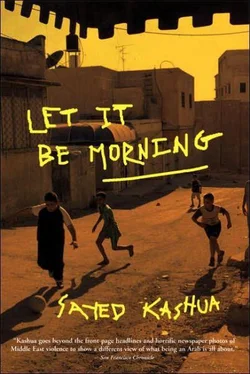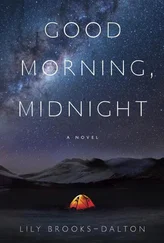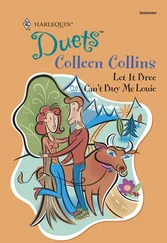The doorbell rings as I’m about to leave. A twelve-year-old boy is standing in the entrance with some tissues, some lighters and a picture of the al-Aqsa Mosque. “Special for you, sir, tissues for two shekels, a lighter for half a shekel, ten for four. Have some, and may Allah protect your children, sir.” I look at him, standing there and begging, with tears in his eyes. I try not to pity him, to remember what Ashraf told me about the hundred-shekels minimum that those bastards make each day thanks to their knack for making us feel sorry for them. I remind myself that I don’t have money to spare and that if I buy from him even once, he’ll be back at this address every time. “Sorry, I don’t need any,” I say. And he goes on begging, with his eyes all moist. “Please, sir, for my parents, and may God bless you and your family, may God bless your relatives who’ve died, please, sir, take something.” I shake my head and lock the door, trying to block out the voice of the boy who runs after me as I get into my car and drive off. I feel a pang in my chest.
It’s the first time I’ve picked up my wife from work. I mean, the first time since we got back. Before that, I’d pick her up almost every day. The paper wasn’t far from the school where she taught and I didn’t want her taking buses. Here she can manage. She could even come home on foot. It’s not far at all. It’s almost one-thirty, and they’re about to finish the sixth period.
My wife teaches in the same school where I used to go. She went there too, but a few years after me. Some kids are playing ball in the yard. Their teacher is sitting on a chair under one of the trees that kids in my class planted on Tu b’Shvat, Israeli Arbor Day. The teacher’s gaze alternates between the kids and her watch. I go upstairs and start walking down the long hallway past the classrooms. I look inside as I pass, in search of the one where my wife is teaching. I can hear the Hebrew lessons and the kids echoing the teacher as loud as they can, “abba” (father), “imma” (mother). Third grade, I tell myself, that’s when they start learning Hebrew. Every now and then I nod in the direction of one of the teachers who taught me, or someone I met at our house when a group of teachers came to welcome my wife after we moved back. Ustaz Walid, the history teacher, sees me, interrupts his lesson and invites me into his classroom. He shakes my hand and declares to the students, “He was like you once, one of my students. But he did all his homework, he was a good student, and look where he is now. He’s a distinguished journalist, who appears on TV. And you don’t want to wind up as factory workers, you want to get to the university too, right?” To which the whole class replies at the top of their voices, “Yes, Mr. Walid.”
I nod, and don’t know where to hide, I’m so embarrassed. What he says is even slightly painful. I know that journalism was a last resort for me because my score on the psychometric exam prevented me from applying to medical school or law school. Besides, my days as a distinguished journalist are slowly drawing to an end, so that even when I do find a good story that I don’t even have to struggle for, a story that’s happening to me damn it, in my own village, I can’t pick up the phone and talk to my editor.
My wife seems taken aback to see me in the hallway. I smile at her, to make sure she knows there’s nothing wrong. She leaves her class for a minute. “Anything wrong? Why aren’t you at work?”
“There’s some kind of roadblock at the entrance to the village.”
“Yes, I heard something about that, but I thought you must have made it out before they closed the road.”
“I didn’t, even though I’ve got loads of work, but it’s no big deal. You’re about to finish, right?”
“In a minute. Come on in.”
I go into her classroom. The children are giggling, whispering to one another. Grade 4-a, the same classroom I was in. My wife gives them homework for the following lesson. All of the questions, 1 to 6, in the chapter about the halutzim , the Jewish pioneers. My wife is a geography teacher, and they’re still teaching the same material they taught twenty or thirty years ago. She writes the words on the blackboard— swamps, eucalyptus trees, malaria, diseases, mosquitoes, children dying, sand, desert.
I doubt the children know who those halutzim were. I had never understood they were Jewish immigrants. It was never stated in so many words. I was convinced they were wise heroes that all of us ought to admire because they invented important things like netting for windows and doors, to keep out the poisonous mosquitoes which used to kill babies.
Sometimes I wonder if my wife herself knows that the pioneers were Jewish immigrants. Sometimes, when I look at the tests she’s correcting, I wonder if she knows what the Jewish National Fund is, considering she’s been singing its praises for years. My guess is that she hasn’t a clue. She just accepts what the books say at face value. She’s always been a good girl, a good wife. If the JNF spends money on land, public parks and playgrounds, that’s what she’ll tell her students.
My wife doesn’t give much thought to questions like that. She’s never really had a chance to know the world outside the village. She’s all of twenty-three. Soon as she graduated from high school she entered Beit Berl Teachers College, like all the good girls do. The best thing a girl can do is become a teacher. Girls who attend Beit Berl succeed in retaining their honor despite going to school. The college is very close to the village. They go there each morning and return home in the afternoon. Unlike women who go to a university, they don’t have to stay away from home, and everyone knows what bed they slept in. The Beit Berl girls are considered the best match. They’re in high demand. You could say they’re both well educated and respectable, besides which they find convenient jobs, which allow them to get home early and to be on vacation precisely when their children are. That’s more or less what my parents explained to me about my future wife before they went to ask her parents for her hand. “There’s nothing better than marrying a teacher,” my mother said, and she still says so.
I doubt my wife knows who Berl Katznelson was, the man that Beit Berl College is named after. In fact, I’m pretty sure she thinks he was a hero and an exemplary educator, because that’s what it says on the sign at the entrance to the college.
The bell rings. They’ve replaced the large copper bell, the one the principal used to operate with an iron rod. They have an electric bell now, one that plays a catchy theme song from a famous movie. The children are delighted. They pick up their chairs and put them on their desks, then rush out of the classroom. My wife packs her bag and is the last to leave. The children emerge from school, running. Some of them stop at the kiosk near the front gate, jostling and buying grape-flavored ice pops.
“So what’ll you do?” my wife asks. “Won’t you go to work today?”
“No,” I say, and I understand she thinks the roadblock was only put there for the morning and that things are back to normal. I look at her now, among her students, and suddenly she seems so small, so young. We’ve had some nice moments, I think. We have. I’m sure of it. I march down the school hallways with her. A few other teachers wave to us. I know they’re watching us. I wonder what they think. I’m sure their thoughts about us are good ones. It crosses my mind that to an outside observer we must seem like the perfect couple, who’ve done everything by the unwritten book of the village. For some reason, this thought gives me new hope. Why not, in fact? What, just because of money? Someday soon things will all work out. I know they will. I walk out of my elementary school with a little smile on my lips.
Читать дальше












